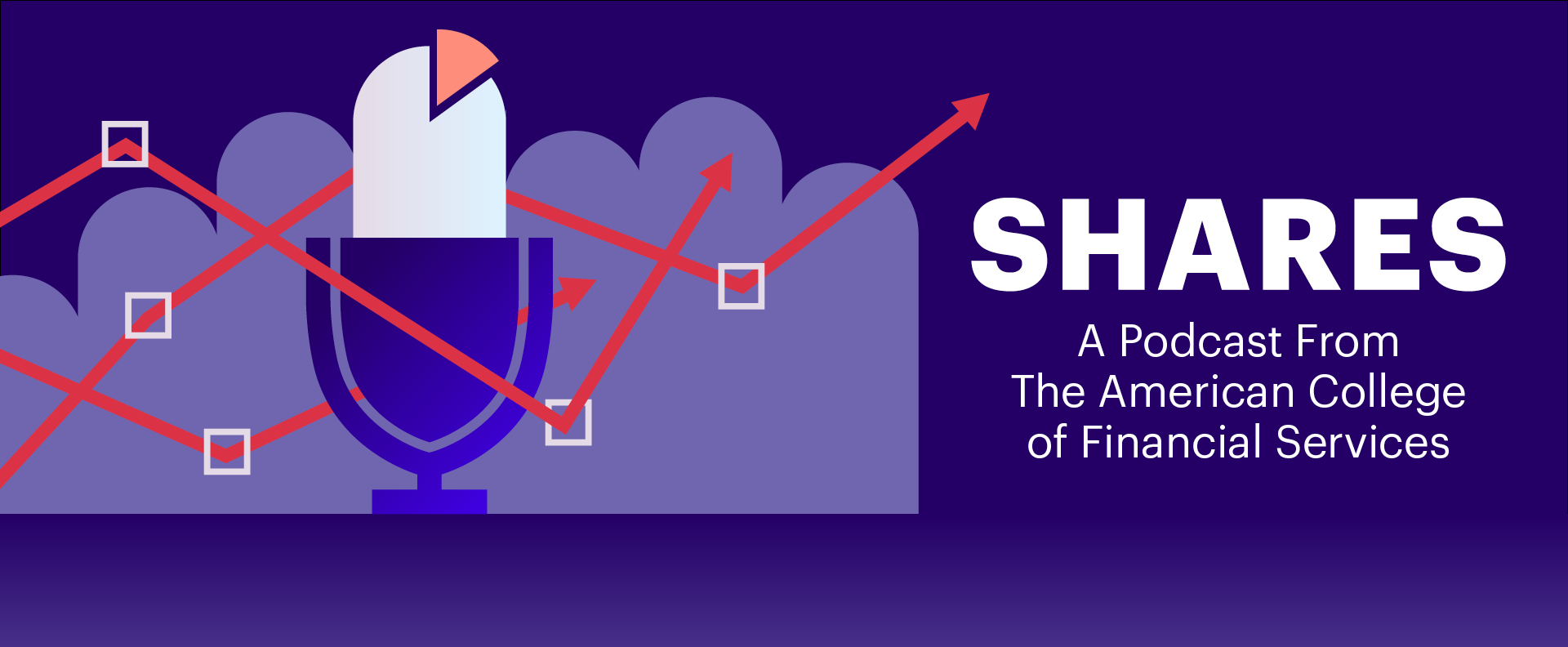Author
Subscribe to Newsletter
Related Posts
INDUSTRY EVENT: MilMoneyCon
Author
Subscribe to Newsletter
Related Posts
INDUSTRY EVENT: AICPA® & CIMA® ENGAGE
Author
Subscribe to Newsletter
Related Posts
INDUSTRY EVENT: Lehigh Valley Philanthropy Institute
Author
Subscribe to Newsletter
Related Posts
INDUSTRY EVENT: Invest In Women
The Guru Gap in Financial Services

In this special episode of the Shares podcast, recorded live at The College’s Horizons 2025 conference, Professor of Practice Steve Parrish, JD, RICP®, CLU®, ChFC®, AEP® speaks with author David McKnight about the ubiquitous nature of financial planning “gurus” in the media today and how their advice, while it may give your clients comfort, may not always be in their best interest. They talk about how to differentiate sound advice from sound bites, and why financial professionals should keep open dialogues with clients about things they hear and what’s backed up by the facts.
David McKnight is an author and president at Power of Zero. He graduated from Brigham Young University with honors in 1997 and has been featured in Forbes, USA Today, The New York Times, Fox Business, Bloomberg Radio, MarketWatch, CBS Radio, CNBC, Yahoo Finance, Nasdaq.com, Reuters, Investor’s Business Daily, Kiplinger, and numerous other national publications. David’s bestselling book The Power of Zero has sold over 400,000 copies and the updated and revised version was published by Penguin Random House in 2018. This book was recently made into a full-length documentary film entitled The Power of Zero: The Tax Train is Coming. When his follow-up book Tax-Free Income for Life launched in November of 2020, it finished the week as the #3 most-sold business book in the world. When his most recent book The Guru Gap launched in December of 2024, it finished the week at #8 on the USA Today Bestseller list and was the top-selling business book in the world. He and his wife Felice have seven children.
Any views or opinions expressed in this podcast are the hosts’ and guests' own and do not necessarily represent those of The American College of Financial Services.
More From The College
- Get tax-savvy advising skills with the Tax Planning Certified Professional™ (TPCP™) Program.
- Secure specialized expertise in retirement income planning with the Retirement Income Certified Professional® (RICP®) Program.
Retirement Planning On-Demand Webcasts
Social Security Law Funding and Future

It’s important advisors stay current on Social Security, especially during periods of change. During this engaging discussion, our thought leaders lead an informative discussion of the current state of Social Security and evaluate the impact of recent and prospective changes on retirement income planning.
The webcast provides an overall update on Social Security today before delving into specific topics regarding the subject, such as the new Social Security Fairness Act, the repeal of the Windfall Elimination Provision (WEP) and the Government Pension Offset (GPO), the funding crisis for the Social Security Trust Fund and possible legislative solutions, and more.
Viewers will come away from this webcast with the knowledge to better serve their clients’ retirement income planning needs.
News Roundup March 5 19 2025
401kSpecialist | The American College Launches Accredited Chat Function
March 5, 2025
This article discusses The College’s exciting new endeavors, including an AI retirement planning tool and The Retirement Course announced at Horizons.
401kSpecialist | What Experts are Saying About the State of Social Security
March 6, 2025
This article about the current state of the Social Security Administration consults a panel discussion between industry experts at The College’s inaugural Horizons conference for more information.
ThinkAdvisor | To Change Your Clients’ View of Retirement, Stop Using This Phrase
March 7, 2025
In this article about a Horizons panel discussion between Wealth Management Certified Professional® (WMCP®) Program Director Michael Finke, PhD, CFP® and Michael Kitces, MSFS, MTAX, CFP®, CLU®, ChFC®, RHU, REBC, CASL, the value of using optimistic language in financial advising is presented.
CNBC | These Accounts Can Be the ‘Worst Possible Asset’ for Retirement, Expert Says. Here’s Why
March 8, 2025
Consulting Professors of Practice Ed Slott, CPA and Jeffrey Levine, CFP®, CPA/PFS, ChFC®, RICP®, CWS, AIF, BFA™, MSA at Horizons, this article examines traditional IRAs.
ThinkAdvisor | Former Republican Social Security Chiefs Deride Musk's Actions
March 10, 2025
This article references insights made in a Horizons panel discussion about the current administration's approach to reshaping the Social Security Administration.
Ministry Watch | As Donor-Advised Funds Grow, so Does Philanthropic Advising
March 11, 2025
This article about philanthropic giving references The College’s Chartered Advisor in Philanthropy® (CAP®) Program as one outlet for advisors looking to help their clients meet their charitable goals.
ThinkAdvisor | Dave Ramsey and Suze Orman Are Not Your Retirement Planning Friends, Author Says
March 11, 2025
Summarizing the points made in a presentation at Horizons, this article discusses the dangers of trusting financial advice “gurus” and how advisors can guide clients’ away from misinformation.
AdvisorHub | The FA Show: On the Road at the Horizons Conference with Michael Kitces
March 12, 2025
This episode of the FA Show features numerous thought leaders and industry experts from The College, all filmed at the inaugural Horizons conference.
BenefitsPro | SSA Cuts to Hinder Benefits Claiming Process, Experts Warn
March 13, 2025
This article about the staffing changes and reshaping of the Social Security Administration (SSA) consults the insights of former Senior SSA Officials Jason Fitchner, PhD and Andrew Biggs’s conversation at Horizons.
Brad Pistole, RICP® | The Retirement Course – The American College of Financial Services
March 17, 2025
In this YouTube video, Brad Pistole, RICP® introduces The Retirement Course, The College’s entirely free program designed to strengthen and enhance financial literacy for pre- and current retirees.
Your Money, Your Wealth | What’s the Future of Social Security Under the New Administration?
March 18, 2025
This podcast episode filmed at Horizons discusses the future of Social Security, including insights from Jeffrey Levine, CFP®, CPA/PFS, ChFC®, RICP®, CWS, AIF, BFA™, MSA, Retirement Income Certified Professional® (RICP®) Program Director Eric Ludwig, PhD, CFP®, Professor of Practice Steve Parrish, JD, RICP®, CLU®, ChFC®, AEP®, and Jamie Hopkins Esq., LLM, CFP®, ChFC®, CLU®, RICP®.
FinServe Ambassadors Talk Future of Financial Advice

Addressing and Unearthing Complexities in the Wealth Journey
Jared Trexler, senior vice president and chief marketing and strategy officer, joined FinServe Network ambassadors Fatima Williams, FSCP®, Dave Valdez, ChFC®, CLU®, AAMS®, CWS®, AIF®, Mónica Clesse, MBA, FPA, and Heather Welsh, CFP®, AEP®, MSFS, for a conversation on financial advice. After introducing the ambassadors, Trexler began the conversation by inquiring about how advisors can address the complexities of individual wealth stories.
When asked, the ambassadors agreed that clients have unique and complex needs, which require specialized knowledge and flexibility to be expertly addressed.
“We help create the plan. So when you have individuals looking for particular goals for themselves, it requires us to be more flexible and knowledgeable on their options,” Williams said. “They’re coming to us with an end goal and the path might look different for everyone, and that’s what we do — we create plans.”
“They’re coming to us with an end goal and the path might look different for everyone, and that’s what we do — we create plans.”
- Fatima Williams, FSCP®
Valdez chimed in with his thoughts on the importance of flexibility in financial advising.
“As the industry has evolved, clients have asked not just to be told what to do. There’s a new clientele of young investors that want to partner, “ he said. “So as an advisor, you have to be able to dance between those lines of being the thought leader in the conversation and being able to influence your client to a better and brighter future, but also having them feel like they’re a part of the decision-making process.”
“To educate and to be willing to be educated,” Williams agreed.
The Value of Comprehensive Financial Advice
Trexler continued by asking the panelists what comprehensive financial advice means to them. The ambassadors concluded that to give solid advice, advisors need to be confident not only in their own specialized knowledge and skills, but also in the skills of others. Whether it be bringing in external CPAs and attorneys or pairing advisors together, the panelists acknowledged the importance of teamwork.
“When I think about ‘comprehensive,’ it doesn’t necessarily mean, ‘Let’s go from A to Z all in one shot.’ Really, it comes down to specialization,” said Welsh. “If you’re just going an inch deep and a mile wide, that’s not necessarily comprehensive. The power of advisors and planners is being able to really say, ‘I work with clients like you. I understand the needs and the complexities…of your situation.’”
“I think that the client also is looking to see a network behind the face,” Clesse said. “So ‘comprehensive’ also involves trust, and them knowing that we have a team with specializations that will help them.”
Williams backed Clesse’s assessment. “It’s important to know what you know really, really well, and also when you don’t know it, and when to bring someone else in who is also great at their job,” she said.
“The power of advisors and planners is being able to really say, ‘I work with clients like you. I understand the needs and the complexities…of your situation.’”
- Heather Welsh, CFP®, AEP®, MSFS
The Evolution and Future of Financial Advice
Next, Trexler asked the ambassadors about the shift in financial advice from seeing products as solutions to seeing them as tools. The panelists were in agreement that the good of the client should come before the satisfaction of selling a product.
“I mean, what is the good of a hammer if you really need a wrench? How do I make an assumption and not be prepared to listen?” asked Williams. “Knowing what you’re offering, knowing what you’re selling, in theory, so that you can be able to pivot and offer an alternative because the other options offer more benefits and solutions for them. It’s really about what benefits the client’s future goals.”
Valdez supported Williams’ statement. “I like to think of the client and the financial plan as like the hub of a wheel, and then the products and services around it are the spokes,” he said. “Once you have that, then you have the actual wheel, and that could take you to the better and brighter destination for your client.”
Bringing the conversation to a close, Trexler asked the panelists how the industry can leverage all the points made in their discussion to drive growth in their firms.
“I never want to lose sight of that this is a relationship business,” Valdez said. “We could talk about products and services and credentials, but at the end of the day, this is all about making connections with a prospect or client and helping them and guiding them through a difficult time or a positive time, whatever it may be. But it’s all about the human connection and the relationship over time.”
Watch the Full Video Discussion
Diversity, Equity & Inclusion Practice Management Insights
The Rising Financial Power of Women

A new report from the CFP Board, Building Wealth: Insights on Women’s Aspirations & Growing Financial Power, sheds light on these evolving dynamics. Women now make up a significant portion of the workforce, with a labor force participation rate of 57.3% in 2024, compared to just 43% in 1969. Additionally, women are more likely than men to attain a college degree, a key predictor of lifetime earnings. These factors, combined with an unprecedented generational wealth transfer, are propelling women into positions of greater financial influence. According to Bank of America, an estimated $30 trillion in wealth will shift to women by 2045.
This growing financial power is evident in the home. The CFP Board report found that four in five partnered and employed women are either the primary income earners or contribute equally to their household’s finances. More than two-thirds serve as the primary decision-makers for investments. However, while confidence in everyday financial management is high, many women still feel uncertain about investing, building wealth, and long-term planning.
The Need for More Women in Financial Planning
Despite this financial shift, the advisory profession has yet to fully adapt. Women want advisors who understand their unique financial journeys — whether that means navigating career transitions, planning for caregiving responsibilities, or building generational wealth. Yet, as of January 2025, women make up only 23.8% of CFP® professionals and the statistics breakdown is similar for designations housed across the industry and even at The College.
This gap isn’t just a pipeline issue; it’s a cultural one. Women in the industry often face systemic barriers to advancement, from gender biases in hiring and promotions to a lack of mentorship and sponsorship. In a recent InvestmentNews article, increasing the number of women with professional designations, such as the CFP®, is one of the most effective ways to drive change. Designations not only provide credibility but also serve as a gateway to leadership roles in the industry. More importantly, when women advisors are present, female clients are more likely to feel understood, respected, and empowered in financial conversations.
What Women Want From Their Advisors
The CFP Board report makes one thing clear: Women have distinct expectations when it comes to financial planning. They want advisors who:
- Craft solutions tailored to their specific challenges
- Communicate complex financial concepts clearly
- Have a proven track record of success
- Hold certifications and designations
- Demonstrate empathy and active listening
Perhaps most notably, while women don’t necessarily insist on having a female advisor, many prefer professionals who share similar life experiences and values. This underscores the need for financial firms to prioritize diversity — not just in gender but in backgrounds and perspectives.
The Opportunity for Financial Advisors
For advisors willing to adapt, the opportunity is immense. Women are seeking guidance on wealth-building strategies, tax planning, estate planning, and long-term care. They are also more likely than men to prioritize caregiving expenses, philanthropy, and healthcare costs — areas that require thoughtful, holistic financial planning.
To better serve women, advisors should consider the following approaches:
- Adopt a more holistic planning model: Women tend to approach financial decisions with a long-term, big-picture perspective. Offering comprehensive planning that integrates retirement, caregiving, and legacy-building can be a game-changer.
- Improve financial literacy resources: While women are financially confident in many areas, they still seek education on investments and wealth management. Hosting workshops, webinars, and one-on-one coaching sessions can make a significant impact.
- Foster more inclusive client experiences: Women value clear communication and a judgment-free environment. Creating spaces where female clients feel comfortable asking questions and exploring their options without pressure can help deepen relationships and trust.
A Call to Action
Women’s financial influence is only growing. The question for the financial industry is whether it will evolve quickly enough to meet their needs. For firms and advisors, this means making intentional efforts to recruit and retain women in the profession, tailoring financial planning strategies to female clients, and, most importantly, recognizing that this isn’t just about business — it’s about equity.
Women are ready to take charge of their financial futures. The industry must be ready to meet them where they are.
More From The College:
- Visit the Center for Women in Financial Services
- Learn more about our Designation Outcomes
Ethics In Financial Services Insights
Azish Filabi Shares Insights AI and Ethics

In the InsuranceNewsNet Magazine article, "AI and Ethics: What Advisors Must Know,” Filabi's commentary underscores the need for advisors to rigorously safeguard client confidentiality and ensure the accuracy of AI-generated outputs through robust oversight measures, such as audits, testing, and certification.
“I think it is important not to put any client information into a technology tool unless you’re absolutely certain what’s going to happen with that information, where the data is going, and that the data is protected.”
- Azish Filabi
Filabi’s insights serve as a timely call to action for industry professionals navigating the rapidly evolving intersection of technology and ethics.
More from The College
- Read the full article here to explore how these guiding principles can help shape the future of ethical AI leadership.
- Stay informed about our latest AI research and initiatives—follow us on LinkedIn for updates and insights.